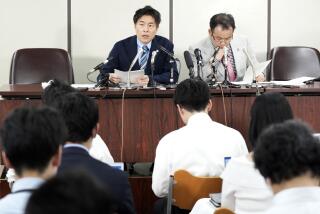Offerings of Taxpayer Funds at Japanese Shrine Barred
- Share via
TOKYO — In a landmark decision greeted with both joy and rage, Japan’s Supreme Court on Wednesday ruled that the use of taxpayers’ money for ritual offerings at religious shrines is unconstitutional.
The decision was based on a case involving the controversial Yasukuni Shrine, an oasis under a canopy of cherry trees in downtown Tokyo dedicated to the worship of the “divine spirits” of about 2.5 million Japanese who have died fighting for their country since 1869.
During World War II, Yasukuni was central to the state religion of emperor worship. Later, the souls of seven “Class A war criminals” who were executed by the Allies, including Gen. Hideki Tojo, were enshrined there.
In 1982, a Buddhist monk and 23 other citizens sued Ehime prefecture in western Japan, claiming that their local government’s practice of sending monetary offerings to Yasukuni violated the constitutional separation of state and religion.
On Wednesday, 13 of the 15 Supreme Court judges agreed.
In a verdict that delighted Buddhist and Christian groups as well as liberals and pacifists, the judges ruled that the ritual offerings were a religious observance that implied preferential government treatment of a particular religion, namely Shinto, Japan’s indigenous faith.
The judgment could make it difficult for Japanese officials to worship at Yasukuni.
Prime Minister Ryutaro Hashimoto’s private visit there last summer generated such animosity among Japan’s neighbors that Hashimoto promised not to return while in office.
The leading dissenter in the decision was Chief Justice Tooru Miyoshi, who argued that “soothing the souls of the war dead is a moral duty.”
Miyoshi wrote that the act of making offerings at the shrine is a social custom and not a religious practice, and that “Yasukuni is the only symbol of memorial to all of [Japan’s] war dead.”
Not so, said Soka Gakkai, Japan’s largest lay Buddhist organization.
“Yasukuni Shrine is not Arlington National Cemetery,” spokeswoman Rie Tsumura said. “It’s a religious site for followers of the Shinto faith. Japanese taxpayers shouldn’t be forced to provide funds for the preferential treatment of religious groups the government favors.”
Japanese Christians have been battling for 30 years to sever the residual links between Yasukuni and the Japanese state, believing that the worship of the war dead as gods is idolatry, said Rev. Tsutomu Moriyama, a minister of the United Church of Christ, which has 200,000 Japanese members.
“Even if I were not a Christian, I would feel that Yasukuni is the backbone of the militaristic emperor worship that suppressed the Asian peoples,” Moriyama said.
Koreans, who were forced to worship at Shinto shrines built by the Japanese during the colonial period, take particular offense when Japanese politicians pray at Yasukuni.
While more than 100 Yasukuni foes gathered near the Supreme Court to celebrate the verdict, about the same number of shrine supporters met to lambaste the decision. And defiant conservatives vowed to step up pilgrimages to their spiritual headquarters.
“It is common practice everywhere in the world for nations to honor those who died for their country,” said Hiroshi Sato, deputy chairman of the Committee to Recognize Dead War Heroes. “This is not the end, this is the beginning of a war.”
The shrine’s supporters included the heads of Shinto shrines and members of the politically powerful Bereaved Families Assn., which was chaired by Hashimoto until he became prime minister.
Masaharu Saeki, chairman of the Ehime branch of the Bereaved Families Assn., noted that the sum of money donated to Yasukuni Shrine during the five-year period covered by the lawsuit was just $1,360--less than 9 cents per resident of the small prefecture.
“I cannot understand how such a big decision could be made on such a tiny sum of money,” Saeki said.
Most local governments stopped giving money to Yasukuni in the wake of the lawsuit, but many Japanese believed that the principle of separation of state and religion remained worth fighting for. The court’s definition of religion was less sweeping than liberals had hoped for, and the issue is expected to be litigated again.
The scope of the decision, which reversed an appellate court verdict, took both sides by surprise.
Foes of Yasukuni Shrine have filed at least 16 lawsuits since 1967, mostly unsuccessfully. They lost the only two previous religious-freedom cases that were heard by the Supreme Court.
One suit was filed by the Christian widow of a Self Defense Forces member who died in an accident while on duty and was enshrined at Yasukuni despite her objections. The Supreme Court upheld the enshrinement in 1988.
In the other case, the high court ruled in 1977 that a city that conducted a Shinto ceremony to bless the construction of a gymnasium was not promoting a particular religion but was acting in keeping with a widely accepted custom.
But in Wednesday’s decision, the court said Ehime’s monetary offerings, used to buy symbolic food for the gods of Yasukuni, was clearly supporting a particular sect’s religious ceremony and thus violated the religious freedoms guaranteed by the Japanese Constitution.
More to Read
Sign up for Essential California
The most important California stories and recommendations in your inbox every morning.
You may occasionally receive promotional content from the Los Angeles Times.













